- 319
- 320SHARES
Note: The Committee for Accuracy in Middle East Reporting in America (CAMERA) sent the following letter to Rev. Darrell Cates, an official with the United Methodist Church in Oklahoma about the Christ at the Checkpoint Conference USA (CATCUSA) he helped organize last October. The conference began in Oklahoma City on Oct. 15, 2018 and ended on Oct. 18, 2018. The letter closes with a challenge to conference organizers: Do they want to engage in anti-normalization activism, or do they want to promote peace in the Holy Land? The full text of the letter follows.
Rev. Darrell Cates February 28, 2019
Director of Conference and Church Relations
Oklahoma United Methodist Foundation
[Address Omitted]
Dear Reverend Cates:
I write on behalf of the Committee for Accuracy in Middle East Reporting in America (CAMERA). CAMERA is a media-monitoring group that promotes fair and accurate coverage of issues related to the Middle East, with a particular emphasis on the Arab-Israeli conflict. Our work can be seen on the internet at camera.org.
As you know, I attended the Christ at the Checkpoint Conference at the Reed Convention Center in Oklahoma that took place last October. This conference, which was organized with substantial support from the Oklahoma United Methodist Foundation, was ostensibly an effort to give attendees the information they need to engage in activism that promotes peace between Israel and the Palestinians.
I have many concerns about this conference. A number of things were said at this conference that clearly contradicted the stated peacemaking goals of its organizers. I will describe these things below, but before I proceed with my concerns, I remind you of three requests or invitations that were made at the conference.
1. At the pre-conference session that took place on Monday Oct. 15, 2018, Jonathan Kuttab, a member of the board of trustees of Bethlehem Bible College and a major organizer of CATC conferences, stated the following:
We believe God loves all people. We do not accept any ideology or any movement or group that has hatred in their hearts, racial hatred toward Jews, toward Muslims, toward any group because we believe antisemitism and Islamophobia and racism are sins and they are sins against God who loves all of us. So feel free if you sense any manifestation of that sin among any of us, among any of the speakers, to call them out on it, because this for us is central.
- On the last day of the conference, Alex Awad, a Methodist missionary and longtime pro-Palestinian activist, declared that he heard from some sources “that some people are offended because they hear antisemitic remarks at Christ at the Checkpoint.” He continued:
Well, please write to me and tell us how we can eliminate [it] because I don’t want to be antisemitic. … I don’t want to be anti-anybody. I want us to be pro-peace, pro-justice, pro-love. That is the desire of Christ at the Checkpoint. So if you are offended, please write me or write Darrell and tell us how you are offended and how we can steer away from offending you because we are committed to a message of peace, love, justice and reconciliation.
- Prior to Alex Awad’s request, you asked attendees to fill out evaluation forms. While making this request, you stated:
We want to improve. We know that there are some things that we think have worked. There are things that haven’t. There are things that perhaps unintentionally we didn’t really understand and we made statements that are hurtful and we would like to know how to respond on a far better way at a possible future event.
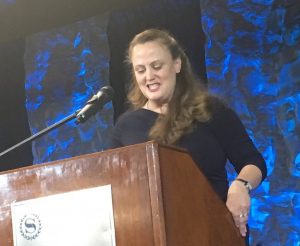
Mae Cannon, executive director of Churches for Middle East Peace (CMEP), warned the Christian peacemaking community about the problems with antisemitic rhetoric at the Christ at the Checkpoint Conference USA that took place in Oklahoma in October, 2018. “I actually got a note from an orthodox Jewish friend of mine on day two of this conference,” Cannon said. “And they said, ‘Are you listening to some of these conversations? Because some of them sound very antisemitic.’” (Photo: Dexter Van Zile)
I also remind you of a statement made by Mae Cannon from Churches for Middle East Peace, who spoke on the last day of the conference. During her presentation, she stated that attendees of the conference need to be on guard against promoting hostility toward anyone. “And I’m talking specifically to our community about antisemitism and statements that summarize and characterize the Jewish people with negative stereotypes that are dehumanizing,” she said.
Cannon continued: “I actually got a note from an orthodox Jewish friend of mine on day two of this conference. And they said, ‘Are you listening to some of these conversations? Because some of them sound very antisemitic.’”
In response to these concerns, Cannon stated that even as attendees seek to address Israeli-perpetrated injustices, “may we not demonize the Jewish people of Israel.”
I introduce Cannon’s comments — which I welcome — to demonstrate that CAMERA is not alone in our concerns about antisemitic discourse at the conference.
In sum, this letter is written response to the requests from you, Alex Awad and Jonathan Kuttab to point out how antisemitism manifested itself at the Christ at the Checkpoint Conference.
It is written in hopes of helping you and other Christians intent on promoting peace between Israel and the Palestinians without demonizing Jews in Israel or anywhere else in the world.
The presence of antisemitic commentary in a Christian peacemaking context is particularly troublesome. By allowing peacemaking rhetoric to serve as a cover for anti-Jewish commentary — even unintentionally — Christians feed into the notion that there is something inherent about Jewish identity that prevents God’s purposes from being manifested wherever Jews are present. This type of thinking has provided a warrant for anti-Jewish violence at numerous points in the history of Christianity and Western civilization. Such thinking is also all too prevalent in Muslim-majority countries throughout the world.
This letter will begin with a few specific instances in which the Jewish people or their institutions were demonized at the conference, offer up some praise of the event, and then close with a list of changes that if made, would make the conference worthy being called a peacemaking conference.
Pre-conference Session
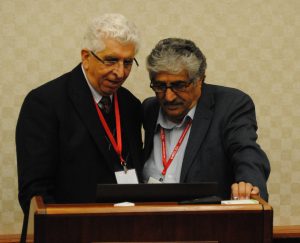
Rev. Alex Awad and Jonathan Kuttab prepare to speak at the pre-conference educational session at the Christ at the Checkpoint USA conference organized by officials from the United Methodist Church in Oklahoma in October, 2018. (Photo: Dexter Van Zile)
Regrettably, the problems began at the pre-conference session presented by Jonathan Kuttab and Alex Awad. I wrote about this opening conference in an article published by the Jewish News Service on Oct. 16, 2018.
During his presentation, Rev. Awad displayed a slide with the words, “Foul! A Recipe for Failure.” Next to this phrase was the photoshopped image of three White House officials surrounding a head shot of U.S. President Donald Trump: Jason Greenblatt, Trump’s special representative for international negotiations; David Friedman, U.S. Ambassador to Israel; and Jared Kushner, Trump’s son-in-law and senior adviser. Awad then told his audience to look at the picture.
“Anything wrong?” he asked. “What’s wrong?”
One audience member said, “They’re all Jews!” And another said, “They’re all Jewish. Rev. Awad then drove the point home.
“They’re all Jewish,” he said. “Millionaires or billionaires.”
Ironically, a few hours later, you (Rev. Darrel Cates), told CATCUSA attendees: “We’re not here to tell you who to blame. That’s too easy.”
In fact, one of the main messages of the introductory session was to convince attendees to believe that the lack of peace between Israel and the Palestinians was the fault of American Jews such as Sheldon Adelson. This is an untrue and irresponsible message to broadcast. It can only contribute to growing hostility toward Jews in the United States and in the Middle East.
Mark Braverman’s Presentation(s)
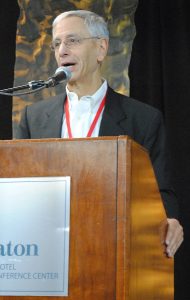
Mark Braverman speaks at CATCUSA in October, 2018. (Photo: Dexter Van Zile)
There were significant problems with the presentation of Mark Braverman, an American Jew who took to the stage on Oct. 16 to signal his moral superiority and condemn the Jewish people. “I do not want to base my identity on being different, better or scared,” he said, with false modesty. “You see where that leads. It leads to the bombs of Gaza. It leads to the checkpoints of Jenin—that’s where it leads.”
Here, Dr. Braverman portrayed Israeli use of force as a sin that is rooted in some sort of mass hysteria, neurosis or psychosis that afflicts Jews living in Israel. This is profoundly unfair, because it doesn’t take into account the events that led up to events Dr. Braverman invoked to portray Israel in an evil light.
Israel has bombed Gaza because it has been attacked by Hamas from that territory, just as it was attacked from Jenin during the Second Intifada.[i] The checkpoints were established after years of Palestinian terror attacks against Israeli civilians.
Dr. Braverman also declared that modern-day Israel is a sick society and that Zionism is a settler colonial project that engaged in ethnic cleansing against the Palestinians. Speaking of the Western Wall, Braverman said, “I do not go to that place. That’s a ‘Nakba’ scene. That’s a genocide scene. That was a Muslim neighborhood that was 600 years old. A woman died when they bulldozed that in 1967. I don’t go there. It’s not a holy place. It’s the opposite.”
Portraying the Kotel where one Palestinian woman was tragically killed by Israeli forces in 1967 as “a genocide scene” is the type of polemics that the only the most ardent anti-Zionists traffic in.
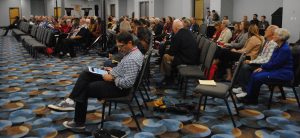
The audience at CATCUSA on the first night of the conference, Oct. 15, 2018. (Photo: Dexter Van Zile)
If CATCUSA’s goal was to promote peace, Dr. Braverman’s talk undermined that goal considerably. Most Jews in Israel and the United States find the rhetoric offered by Anglican Priest Rev. Dr. Naim Ateek hostile and antisemitic, but Braverman promoted his writings, stating that from reading Ateek, he learned that Jesus was the best prophet and best rabbi of all. This is an ugly form of supersessionism that serves to denigrate Jews who remain faithful to mainstream Judaism.
Dr. Braverman also asserted that modern-day Jews in America and elsewhere don’t really have any connection to the Hebrew people described in the Hebrew Scriptures. They are instead descendants of a tribe in Europe that converted to Judaism in the eighth century – a theory debunked long ago. This “Khazar” trope is regarded as antisemitic by most Jews with good reason. I just saw a reference to the “Khazarians” in the comments section of an article that dealt with the sale of U.S. government debt to foreign investors. The implication was that Jews were behind the alleged financial chicanery that the poster was complaining about. It portrays Jewish identity as a fraud, an act of chicanery.
In sum, the image of the Jewish people that Dr. Braverman offered to the audience was that of a benighted, violent people who are unable to come to peace with themselves and the people around them. Such an image can only serve to justify further acts of violence against Jews living in Israel and hostility toward Jews in the United States.
CATCUSA organizers have no right to anoint Dr. Braverman as a credible Jewish voice to speak about the conflict. He is a marginal figure. While he remains a Jew, Dr. Braverman regularly preaches from the New Testament in churches on Sunday mornings. By his own admission, this causes people to ask him when he converted to Christianity.
Could CATCUSA not find someone more representative from the Jewish community when organizing its conference? It is simply irresponsible for CATCUSA to capitalize on Dr. Braverman’s alienation from the mainstream Jewish community to promote its message.
CATCUSA has every right to choose whoever it wants to speak at its conference, but as a Christian, one has to ask if it’s the right thing to do. (As Paul declared in 1 Corinthians 6:12, all things are lawful, but not all things are helpful.)
Was it really helpful or responsible to have Dr. Braverman speak at the conference?
Stephen Sizer
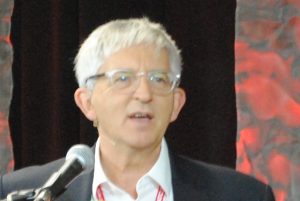
Rev. Dr. Stephen Sizer speaking from the podium at CATCUSA in 2018. (Photo: Dexter Van Zile)
To make matters worse, Rev. Dr. Stephen Sizer, an Anglican Priest who was censured by his superiors in the Church of England for, among many other things, promoting articles that blamed Israel for the September 11, 2001 attacks, was also a featured speaker at the CATCUSA conference. Conference organizers truly interested in the cause of peace would not include Rev. Dr. Sizer on their agenda. Rev. Dr. Sizer has banged on about the evils of Zionist influence on American politics in two of the most antisemitic countries in the world: Malaysia and Iran. Why invite him to a “peacemaking” conference? (Again, CATCUSA has every right to invite whoever it wants, but was it the right thing to do?)
Predictably, Rev. Dr. Sizer offered up a theology that was equally antagonistic to Jewish identity and self-understanding. During his talk, he declared that “the Hebrew Scriptures are about Jesus Christ. If you don’t see Jesus as central to a book of the Old Testament, you have not understood it.”
Rev. Dr. Sizer directed the force of this hermeneutic toward Christian Zionists. But in attacking Christian Zionists, he obliquely condemns Jews — who regard the Hebrew Scriptures as telling their history — as obdurate and blind because of their refusal to see Jesus Christ in these texts.
That there is something wrong with Jews for failing to accept Jesus as their messiah has been a persistent idea that has been offered with varying degrees of explicitness at Christ at the Checkpoint conferences in the West Bank.
Interestingly enough, the notion that Muslims do not understand Jesus could also apply to Muslims in the Middle East. But this polemic is rarely directed at this community at CATC events, largely out of respect for Islamic religious sensibilities. That’s a good thing. But the differential manner in which CATC speakers have dealt with issues related to Islam and Judaism over the years is remarkable.
Simply put, CATCUSA allowed supersessionist Christians to put Jews behind the eight-ball so to speak.
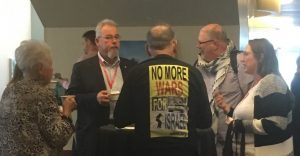
An attendee at the Christ at the Checkpoint Conference USA organized by officials from the United Methodist Church in Oklahoma sports a T-shirt blaming Israel for United States’ involvement in wars. “NO MORE WARS FOR ISRAEL” the shirt states. (Photo: Dexter Van Zile)
The overall message of CATCUSA was that Jewish power and sovereignty are the singular source of Palestinian suffering. The implication of the conference was that the Arab-Israeli conflict will not end until Jews become more like Christians, stop being Zionists and stop wielding power in defense of their own safety and welfare.
Aside from a few brief comments from Gerald McDermott, there was an egregious silence about what Palestinians would have to do to contribute to a peaceful settlement of the Israel-Palestinian conflict. That this happened at a so-called peacemaking conference is sad, but not surprising. Intra-Christian debate over how faithful Christians should respond to conflict in the Middle East regularly descends into anti-Jewish polemic.
Some Positives
In spite of these criticisms, I must acknowledge some positive aspects of the conference.
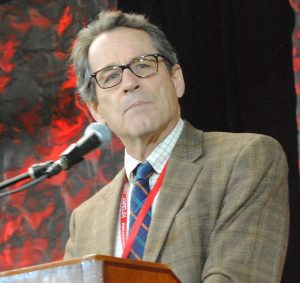
Rev. Dr. Gerald McDermoott, Anglican Professor of Divinity at Beeson Divinity School in Alabama, challenges the audience at the Christ at the Checkpoint USA conference held on Oklahoma last October. (Photo: Dexter Van Zile)
In particular, the decision to invite Rev. Dr. Gerald McDermott to speak about the “New Christian Zionism” was helpful to the cause of fully understanding the theological underpinning of Christian support for Israel.
During his presentation, Rev. Dr. McDermott made a cogent argument that Christian Zionist support for Israel does not preclude the creation of a state for the Palestinians alongside the Jewish state.
The notion that Christian Zionist support for Israel represents an unalterable obstruction to the creation of a Palestinian state has been a persistent aspect of polemics from the Palestinian Christians involved in Bethlehem Bible College and other Palestinian Christian organizations in the West Bank and the Gaza Strip.
Rev. Dr. McDermott’s presentation was a particularly forceful response to this line of attack. His reference to Islam as a supersessionist religion during the Q and A session was on point and needs to be elucidated further in future conferences.
Along these lines, I must add that allowing Christian Zionists to speak has been a persistent aspect of CATC conferences. Allowing people like Rev. Dr. McDermott is not a new phenomenon at CATC conferences.
In the past I have wondered if Christian Zionists have been set up as a sacrificial lamb at CATC events, but between Rev. Dr. McDermott’s presentation at CATCUSA in Oklahoma, and Rev. Dr. Michael Brown’s excellent presentation at the CATC event in the West Bank earlier in 2018 (which I wrote about here), my concerns have been alleviated somewhat.
On this score, the CATC provides a model for allowing its critics to speak that I wish Hamas and the Palestinian Authority would follow (instead of throwing their critics in jail — or worse).
There was another moment on the last day of the conference when Sami Awad announced, to great applause, that the Israeli Supreme Court had ruled in favor of Lara Alqasem, the American activist who promoted BDS against Israel. She had been barred from entering the country but was allowed into Israel after the court issued its decision.
It may not have been Sami Awad’s intention, but by acknowledging the court’s decision to allow a vocal critic of Israel, he underscored an important point that attendees must remember: Israel is a democracy that has regular elections (unlike the Palestinian Authority), which allows people to exercise their right to criticize government policies.
Sadly, the same cannot be said about the Palestinian Authority or Hamas. In your interactions with Bethlehem Bible College, I ask that you encourage the institution to be more vocal and forceful in its criticism of the authoritarianism, hate speech, violence and corruption promoted and tolerated by the Palestinian Authority and Hamas and to address the Jew-hatred that afflicts Palestinian society.
Officials from Bethlehem Bible College will tell you that they already did this at the 2016 CATC conference when they addressed the issue of religious extremism. But the fact is, they have condemned Christian Zionism at every conference while remaining relatively silent about problems associated with Islamic supremacism, which has resulted in millions of deaths in the Middle East over the past century.
How to Improve Next “Peacemaking Conference”
In hopes of promoting a more fruitful discussion of the things that make for peace at CATC conferences, I offer a few suggestions to improve the program. I do not wish to be presumptuous in offering these suggestions, but I have been to five CATC conferences and have done a lot of thinking about the conference.
Here they are:
- Promote understanding of Koran, Hadiths, Mohammad’s biography and how these various sources of tradition within Islam promote hostility and violence toward Jews, Israel, Christians, non-Muslims and Muslims in the Middle East.
- Address issue of supersessionism in Christianity and Islam. Jewish sovereignty is anathema to the Islamic nomos or sense of order. Some scholars and politicians in Muslim-majority countries are coming to grips with this reality, but supersessionist attitudes on the part of both Christians and Muslims need to be addressed. (When Christian peacemakers fail to address the theological roots of Muslim antisemitism — as they so often do — it undermines their ability to gain the confidence of Jews who are targets of this hostility.)
- Promote honest discussion of human and women’s rights in Muslim-majority countries.
- Confront incitement in Palestinian society and the role of the PA and Hamas in promoting hostility toward Jews and Israel.
- Address the negative impact that Haj Amin Al-Husseini has had on Palestinian political culture (and on the political culture of the Middle East in general).
- Confront corruption in the Palestinian Authority.
- Confront authoritarian tyrannical nature of PA and Hamas rule.
- Promote honest discussion of what happened at Oslo/Camp David/Clinton Parameters. This issue has always been given short shrift at pre-conference sessions.
- Address Hamas’s ideology.
- Include testimony from Israeli Jews who have suffered from Palestinian violence.
- Bring in settlers and Israelis to talk about their experiences as to understand their perspective on why they live in the land and how they view the conflict. (I understand that settlers have spoken at previous CATC conferences, but they have come from the “left” side of the political spectrum in Israeli politics. Can attendees sit through a talk by an Israel living in Hebron or Kiryat Arba? I suspect security may be a concern, but other speakers have spoken to CATC audiences via internet video.)
I make this last suggestion because for many years, Israeli settlers in the West Bank have been portrayed as the “repugnant other” by activists throughout the world. If peace is to come in the Holy Land, this strategy has to be reversed.
These suggestions present CATC organizers at Bethlehem Bible College with a choice: Are they anti-normalization activists or are they “peace” activists? In the years I have been observing CATC conferences, I have discerned that conference organizers have been very effective in using Jewish and Christian notions of morality and ethics to portray Jewish power in a negative light without using the same rules of morality to assess Palestinian, Arab or Muslim behavior. The overall impact of this strategy has been to stoke Jewish fear and anger.
This is not what peacemakers should aspire to.
Forgive the length of this letter and thanks very much for your time.
Best regards,
Dexter Van Zile
[i] Dr. Braverman’s use of “Jenin” as symbol of Israeli misdeeds is also irresponsible given what actually happened in this city in 2002.
